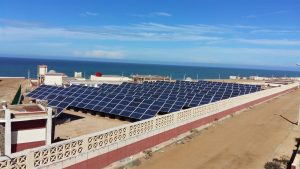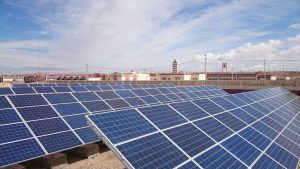 Insecure, loud and sooty – these were the characteristics of the power supply for the fishing village Aftissat in the south of Morocco until about 2 years ago. Now the situation has changed fundamentally thanks to a modernisation campaign by the Moroccan fisheries authority (ONP). Our Moroccan Premium Partner SEWT sarl has tackled the problem and developed a photovoltaic-based energy supply for the village. The new solar hybrid system not only provides fishermen with electricity around the clock, but is also environmentally friendly and contributes to the country’s ambitious climate protection targets.
Insecure, loud and sooty – these were the characteristics of the power supply for the fishing village Aftissat in the south of Morocco until about 2 years ago. Now the situation has changed fundamentally thanks to a modernisation campaign by the Moroccan fisheries authority (ONP). Our Moroccan Premium Partner SEWT sarl has tackled the problem and developed a photovoltaic-based energy supply for the village. The new solar hybrid system not only provides fishermen with electricity around the clock, but is also environmentally friendly and contributes to the country’s ambitious climate protection targets.
With an annual production of 233,000 kWh, the system is able to cover the daily energy needs of the fisher’s village every day of the year. Refrigeration, cold storage units, shops and domestic infrastructure constantly consume around 600 kWh electricity per day. The PV hybrid system has been designed for autonomous self-consumption and helps to reduce diesel costs by 95 percent and CO2 emissions by 99 percent. The whole system is PV centralised, therefore diesel generators are still part of the system but only needed as a back-up in times of low irradiation or low batteries. Thus, for the fishermen a secure and clean power supply was realised. This means a significant improvement in living and working conditions.
 The off-grid installation in Aftissat is composed of 504 IBC PolySol 250 CS solar modules, 18 inverters by SMA and batteries with a storage capacity of 800 kWh. All components except for the batteries have been delivered by IBC SOLAR and installed by the local experts of SEWT, who were also responsible for the system’s overall design.
The off-grid installation in Aftissat is composed of 504 IBC PolySol 250 CS solar modules, 18 inverters by SMA and batteries with a storage capacity of 800 kWh. All components except for the batteries have been delivered by IBC SOLAR and installed by the local experts of SEWT, who were also responsible for the system’s overall design.
The project was commissioned by Morocco’s National Fishery Office in order to contribute to Morocco’s national green energy plan. This includes a growing development of wind, solar and hydro energy, and the reduction of fossil fuel subsidies. It is scheduled to increase the share of renewable energies within the energy mix to 42 percent by 2020 and to 52 percent by 2030. The fishing industry in Morocco is a leading foreign exchange earner, accounting for 16 percent of total exports. The National Fishery Office strongly intends to boost the modernisation of the domestic fishery sector.